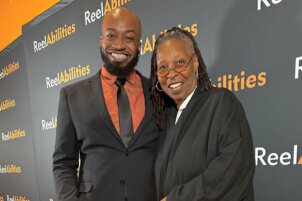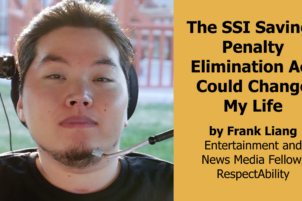Early on in my Fellowship with RespectAbility I kept hearing the phrase “disability is not a monolith.” The definition of a monolith is a group of people who are thought of as being all the same. On the surface, it makes sense. No two people living with the same disability are the same or have the same experiences. However, I wondered what specific differences were important for me to be aware of to be a better ally. Learning about the different language choices and preferences felt like a significant piece to the puzzle. Having some previous knowledge of this didn’t mean I needed to stop learning. Language is constantly evolving, and since our words matter, I wanted to make sure this was an area I focused on.
The National Center on Disability and Journalism (NCDJ) has a comprehensive language style guide that breaks down different disability related terminology and diagnoses with background information and recommendations of inclusive, respectful language to use. Having access to a single source that covers a broad range of frequently discussed topics surrounding disability language etiquette has been an incredible asset in my learning journey.
It’s important to note that there is no universal rule on what language to use when describing someone with a disability. Only a person living with a disability can provide their preference, and those preferences will vary from person to person. You should always ask the person what language they prefer, but when you don’t have a direct source available, the NCDJ guide is a great tool to use.
I’ve used this guide a couple different ways. I’ve used it in social situations when a friend or family member, usually unknowingly, used an outdated term. I find in those situations providing simple details on the context of why it’s harmful and giving a more respectful recommendation is typically received well and effective. I sometimes struggle with finding the right words in those situations, but with the guide, I feel more confident in those sometimes difficult conversations. I’ve also used it personally when I find myself unaware of what the appropriate language is for a specific disability. When it comes to language surrounding disability, there is a lot to be aware of and remembering that can feel overwhelming. I find NCDJ’s guide to be a reliable source of reassurance in these moments.
The guide has also helped me to better identify every day casual language that contributes to negative disability stigmas. Included in the guide are numerous examples of ableist language and harmful euphemisms. Gaining an understanding of these words and phrases has helped me recognize the prevalence of them in all sorts of situations. By simply being aware that these phrases are offensive, I have worked to eliminate them from my language.
If becoming a stronger ally is important to you, I encourage you to explore NCDJ’s guide and your own language. If you are surprised to learn you use any outdated or harmful words, it’s important to know that it doesn’t make you a bad person. Being open and willing to learn is what matters.








